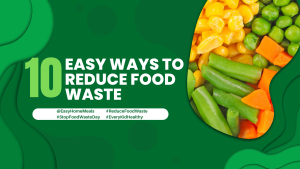The Benefits of Frozen Foods: 12 Reasons Why Frozen Foods Are Better
We all know that popping a frozen meal in the oven or microwave can be very convenient. But did you know that there are many other advantages of frozen food for you, your wallet and the planet?
1. Availability & Freshness:
Within hours of picking, fresh fruits and vegetables are processed and quick frozen to prevent any deterioration of flavor, quality, texture, or nutrition. And frozen foods, which remain virtually unchanged in storage, eliminate losses experienced from spoilage and shrinkage. Frozen at the peak of perfection, seasonal limitations are a thing of the past.
2. Time-Saving Convenience:
Frozen foods are the epitome of convenience. The cleaning, picking, dicing, and chopping has been done for you. Whatever you choose, it’s all prepared, ready to take from your freezer, heat, and serve.
3. Economic Choice:
Frozen foods are economical. You don’t pay for stalks, pits, skins, rinds, or damaged food. Edible ounce for edible ounce, frozen food costs are usually less than their fresh counterparts, and they don’t tend to vary widely in price.
4. No Preparation and Added Food Safety:
Frozen foods offer explicit cooking directions, leaving no room for error and under-cooked food. And because the preparation (dicing, chopping, etc.) has already been done, all you have to do is heat and serve, leaving less chance for contamination.
5. Sealed Freshness:
Freezing foods seals in freshness. Foods designed for the freezer are selected at their peak of nutrition and flavor, quickly processed, and frozen within hours.
6. Informative Labeling and Portion Control:
Frozen food packages tell you what you’re eating. Packages have ingredient and nutrition labeling for exact portion sizes. If you’re health-conscious, counting calories, or on doctor’s orders, frozen foods can help.
7. Longer Frozen Food Storage Life:
Frozen foods have a longer shelf life than fresh, offering maximum flexibility for meal consumption. For example, frozen broccoli can stay fresh in the freezer for up to eight months. Just be sure to follow proper frozen food storage guidelines for optimal storage life.
8. Less Food Waste:
With frozen foods, you have food that is 100 percent edible. You don’t pay for waste such as pits, shells, or peels. Studies show that a significant portion of a raw vegetable is lost in shelling and peeling.
9. Optimal Nutrition:
There’s no better-known means of preserving food than by freezing. Commercial rapid-freezing processes maintain the nutritional quality of products without chemical preservatives.
10. Consistent High Quality:
Frozen foods are consistent in quality. Only the best ingredients are used, thanks to stringent industry quality control procedures.
11. Superior Taste:
Frozen foods can pass the most discriminating taste tests. Frozen food recipes are created by some of the world’s finest chefs. Freezing ensures consistently uniform product quality.
12. Unbeatable Value:
Because frozen foods fit modern lifestyles, they offer incomparable value in several ways: dollar savings, nutrition and quality, time savings, and energy-saving.
What are some other reasons you prefer using frozen food? Share your thoughts with @easyhomemeals on social media and follow to hear about upcoming frozen food sweepstakes and giveaways, new recipe ideas, and cooking tips!






